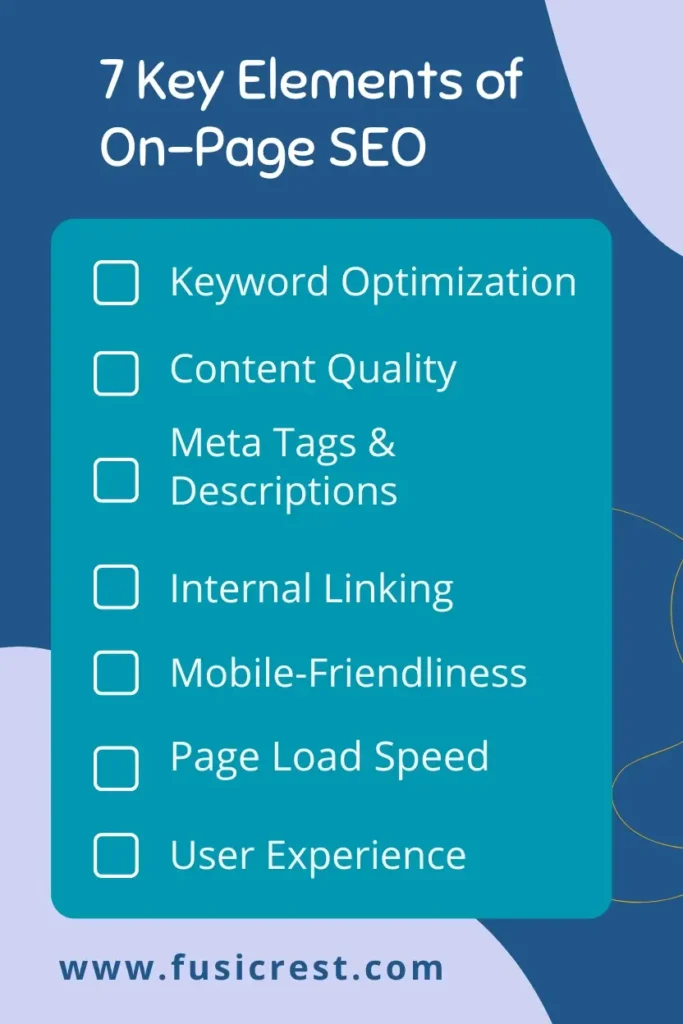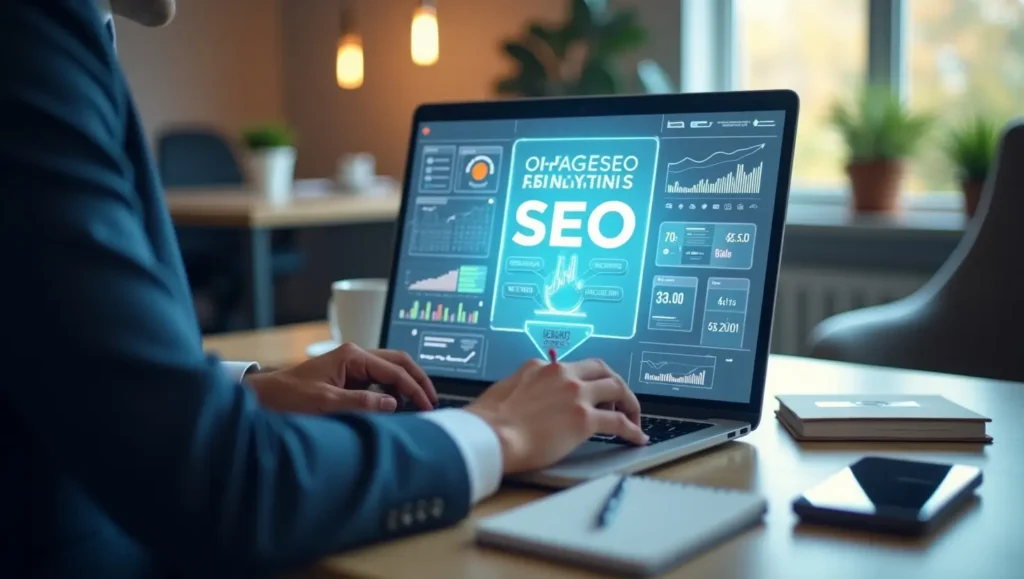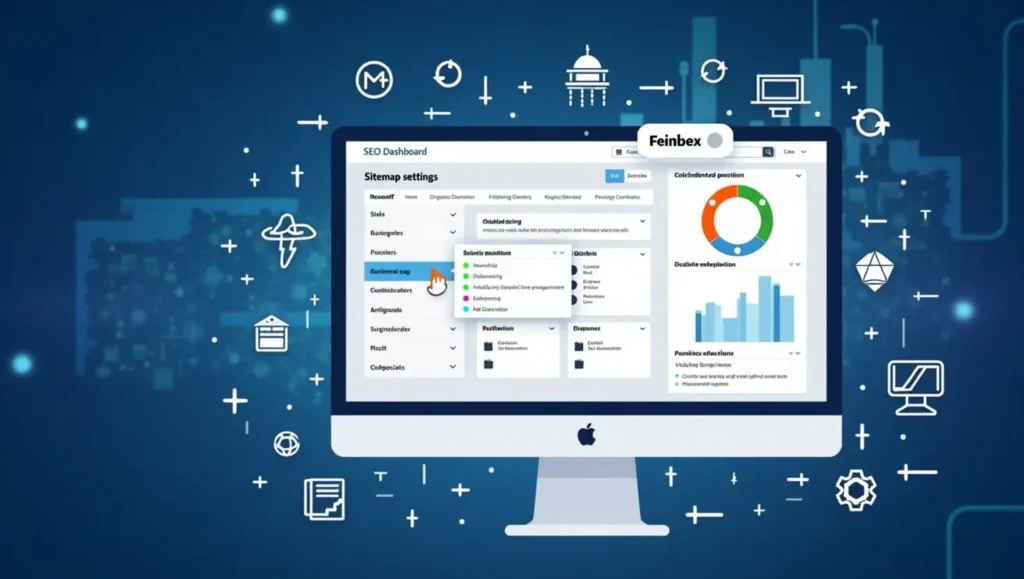In today’s fast-paced digital world, businesses are constantly competing for online visibility. Whether you’re a small local business or a large enterprise, on-page SEO is essential for standing out in a crowded marketplace. On-page SEO refers to optimizing the content and structure of individual web pages to rank higher in search engine results and attract more organic traffic.
This blog is part of our series, Unlocking Success: The Game-Changing Benefits of Professional On-Page SEO, where we break down the most effective SEO practices to help you achieve long-term success.

By the end of this guide, you’ll understand how professional on-page SEO can boost your website’s visibility, improve user experience (UX), and drive more conversions.
From keyword optimization and content quality to mobile-friendliness and page speed, we’ll explore the key strategies that make on-page SEO a game-changer for businesses. Whether you’re new to SEO or looking to refine your existing strategy, this blog will provide actionable insights to help you unlock your website’s full potential.
Stay tuned as we dive into the benefits of professional on-page SEO, share real-life examples, and link to detailed guides on specific topics. Let’s get started!
Table of Contents
ToggleThe Basics of On-Page SEO
On-page SEO is the foundation of a successful digital marketing strategy. It involves optimizing individual web pages to improve their search engine rankings and attract more organic traffic. Here’s a high-level overview of the core elements of on-page SEO:
1. Keyword Optimization:
Integrating relevant keywords naturally into your content, title tags, meta descriptions, and headers. To master this, explore our guide on 10 advanced keyword research techniques every SEO expert needs to know. This helps search engines understand what your page is about and match it to user queries.

2. Content Quality:
Crafting valuable, informative, and engaging content that answers user queries and provides real value. High-quality content keeps users on your site longer and encourages them to explore further. To achieve this, implementing proven strategies to boost content quality can help improve readability, engagement, and overall SEO performance
3. Meta tags and descriptions:
Writing compelling and optimized meta descriptions and title tags that entice users to click on your link in search results. For actionable tips, check out our guide on 7 proven tips to optimize meta tags and descriptions for SEO success.
4. Internal Linking:
Linking to relevant pages within your website to keep users engaged and guide them toward other valuable content. This also helps search engines understand the structure of your site. Discover the secrets of effective internal linking in our blog on 5 must-know internal linking secrets for SEO success.
5. Mobile-Friendliness:
Ensuring your website is optimized for mobile devices, considering that over 50% of internet traffic comes from mobile users. Learn how to optimize your site with our guide on 5 mobile-friendliness hacks to skyrocket your website’s authority.
6. Page Speed:
Ensuring your website loads quickly, as search engines like Google prioritize faster-loading pages. Improve your site’s performance with our blog on 10 proven ways to improve page load speed for higher rankings.
7. User Experience (UX):
Enhancing site navigation, reducing bounce rates, and ensuring a smooth, enjoyable experience for visitors. Avoid common pitfalls by reading our blog on 8 user experience mistakes that are killing your website’s performance.
Why Professional On-Page SEO Matters
A. Increased Visibility in Search Engine Rankings
The primary benefit of on-page SEO is the potential for improved search engine rankings. When your website is optimized, search engines like Google can crawl your pages more effectively and understand the content. As a result, your website is more likely to appear at the top of search results for relevant keywords.
Real-Life Example:
A small e-commerce store that specializes in eco-friendly products faced stiff competition for the keywords “sustainable products” and “eco-friendly home goods.” After working with a professional SEO agency, they optimized their product descriptions, titles, and meta descriptions using AI for better ranking. Within three months, their organic traffic increased by 50%, and they saw a rise in rankings for their target keywords.
Expert Insight:
According to Backlinko, the average word count of a top-ranking page is around 1,890 words. This suggests that detailed, well-researched content that provides more value is likely to rank higher. By focusing on high-quality content, businesses can improve their visibility and attract more organic traffic.
B. Enhanced User Experience (UX)
On-page SEO is not only about pleasing search engines but also about improving the user experience (UX). Google places a strong emphasis on the user experience, with algorithms designed to prioritize websites that provide a smooth, fast, and intuitive experience.
Key UX factors include:
- Page Load Speed: Websites that load slowly tend to have higher bounce rates, which negatively impacts rankings. A fast-loading website increases the chances of retaining visitors and improving SEO performance.
- Mobile-Friendliness: With more than 54% of global web traffic coming from mobile devices, having a mobile-friendly website is crucial. You can read more about it from Search Engine Journal. Google’s Mobile-First Indexing means the mobile version of your site is used for indexing and ranking.
- Clear Navigation: A website with a well-organized structure and clear navigation ensures users can find what they’re looking for quickly, leading to longer visit durations and reduced bounce rates.
Real-Life Example:
A local restaurant in the U.S. saw a significant improvement in their online visibility after optimizing their website for mobile users. By focusing on site speed and improving the layout for mobile visitors, they saw a 35% increase in mobile traffic and a 20% increase in reservations from mobile users.Z
Real-Life Examples of On-Page SEO Success
Boosting Organic Traffic for an E-Commerce Business
An online retailer selling eco-friendly products was struggling to rank for competitive keywords. After conducting a thorough SEO audit and implementing on-page SEO strategies—such as optimizing product pages with relevant keywords, improving title tags, and adding more informative content—they experienced a 50% increase in organic traffic within just three months. As a result, they saw more product sales and a stronger brand presence in their niche.
Increasing Local Visibility for a Service-Based Business
A local law firm in the U.S. noticed that although they were getting decent traffic, their conversion rates were low. After investing in professional on-page SEO to optimize their website for local search by adding location-based keywords and improving their meta descriptions, they saw a 35% increase in conversions and higher rankings for local searches.
These case studies show that professional on-page SEO doesn’t just drive traffic but also boosts conversions and helps businesses outperform competitors.
Expert Insights and Industry Data
To truly understand the importance of on-page SEO, let’s dive deeper into expert insights and industry data that back up these claims.
- Content Length & Quality:
According to Backlinko, long-form content (over 1,500 words) tends to perform better in search rankings. This is because longer content is more likely to cover a topic in-depth, answering a wide range of user queries. For example, the top-ranking content often has over 1,800 words
and includes a comprehensive analysis of the topic.
- Mobile Optimization:
- Google reports that mobile-friendly websites rank higher in search results. As more people use smartphones to search, Google has shifted to Mobile-First Indexing, meaning it now uses the mobile version of your website for indexing and ranking. A Statista report shows that 54% of global web traffic comes from mobile devices, highlighting the critical need for mobile optimization.
- Page Speed & SEO:
- Google has emphasized that page speed is a ranking factor. According to a survey by Hubspot, 40% of users abandon a website if it takes longer than 3 seconds to load. This highlights how important site speed is for both user experience and SEO rankings.
Expert Insight:
Neil Patel, an SEO expert, states, “Optimizing your website’s on-page elements not only helps you rank higher but also ensures that your site is providing the best possible experience for your users, which ultimately leads to increased conversions.”
Key Benefits of Professional On-Page SEO
A. Boosts Organic Traffic
By optimizing on-page elements like keywords, meta descriptions, and content quality, you increase the chances of ranking for relevant search terms. When your website ranks higher, it attracts more organic traffic from users actively searching for the products or services you offer.
B. Improves Website Usability
On-page SEO helps improve user experience by ensuring that your site loads quickly, is easy to navigate, and is mobile-friendly. By improving usability, visitors will stay longer on your site, reducing bounce rates and increasing engagement.
C. Keeps You Competitive
Investing in on-page SEO ensures that your website ranks well for relevant keywords, giving you a competitive edge. This is especially crucial in industries with high competition. By optimizing your site, you’re not just improving rankings but also ensuring that you’re staying ahead of the competition.
D. Increases Conversion Rates
Conversion optimization is a key benefit of on-page SEO. When you attract qualified traffic through well-optimized content, you can convert those visitors into customers. Learn more about conversion optimization in our guide to boost your digital business. Optimizing landing pages, product descriptions, and CTAs for SEO increases the likelihood that visitors will take the desired action. For more on how content marketing drives conversions, check out HubSpot’s Content Marketing Guide.
The Role of Keyword Strategy in On-Page SEO
Keyword optimization is one of the most important aspects of on-page SEO. It’s not just about stuffing your pages with keywords—it’s about using them strategically to match user intent.
Best Practices for Keyword Strategy:
- Primary Keywords: These are the main keywords you want to rank for. Place them in important places such as title tags, meta descriptions, URL, and headings.
- Secondary Keywords: Use related keywords throughout the content to add depth and context to your pages.
- Avoid Keyword Stuffing: Google penalizes websites for keyword stuffing, so make sure to include keywords naturally within the content.
Real-Life Example:
A local bakery used a targeted keyword strategy to optimize their product pages for keywords like “fresh baked cookies near me” and “best bakery in [city name].” After implementing these strategies, their local search traffic increased by 45%.
How On-Page SEO Impacts SERP Rankings
Search engines like Google use a variety of factors to determine how websites rank on their search engine results pages (SERPs). By continuously optimizing for key on-page elements, you increase your chances of ranking higher.
Key Ranking Factors:
- Relevance of Content: Make sure your content answers the search intent behind the keywords you are targeting.
- Page Load Speed: Fast-loading websites tend to rank better.
- Mobile-Friendliness: Google prioritizes mobile-friendly sites.
- User Engagement: Metrics like time on page, bounce rate, and CTR influence rankings.
Conclusion: Invest in Professional On-Page SEO for Long-Term Growth
On-page SEO is an essential element for any website aiming to succeed in the competitive digital landscape. By improving content quality, optimizing for keywords, and focusing on user experience, businesses can boost their rankings, drive more organic traffic, and increase conversions.
Investing in professional on-page SEO isn’t just about ranking higher—it’s about ensuring your website provides value to your visitors, answers their questions, and delivers the best possible experience.
Want to improve your website’s visibility, traffic, and conversion rates? Get in touch with our team of experts today for a free SEO audit and start optimizing your website for long-term growth and success. For more insights into creating high-quality content, check out our blog on 10 Proven Strategies to Boost Content Quality and Skyrocket Your Rankings.
FAQs
1. What is On-Page SEO and Why is It Important?
On-page SEO refers to the practices you apply to your website’s content and structure to help it rank higher in search engine results. It includes optimizing elements like keywords, content quality, meta tags, page speed, and user experience. It’s important because it helps search engines understand your content and improves your website’s visibility, traffic, and user engagement.
2. How Does On-Page SEO Affect Search Engine Rankings?
On-page SEO directly impacts how search engines rank your website. By optimizing content quality, keywords, meta tags, and site structure, search engines like Google can easily crawl and index your pages. This increases the chances of your website ranking higher for relevant search queries, resulting in more organic traffic.
3. What Are Some Key On-Page SEO Factors I Should Focus On?
The main on-page SEO factors to focus on are:
- Keyword optimization: Use relevant keywords naturally in your content.
- Content quality: Provide valuable, informative, and engaging content.
- Page speed: Ensure your website loads quickly.
- Mobile-friendliness: Optimize for mobile users.
- Meta descriptions and tags: Write compelling meta descriptions and optimize title tags.
- Internal linking: Link to relevant pages within your website.
4. How Long Does It Take to See Results from On-Page SEO?
The time it takes to see results from on-page SEO can vary depending on several factors, such as competition, the quality of your optimizations, and how frequently you update your content. Typically, businesses can see noticeable improvements in rankings and traffic within 3 to 6 months of consistent optimization.
5. Can On-Page SEO Help Improve Conversion Rates?
Yes, on-page SEO can significantly impact conversion rates. By optimizing for user intent and ensuring your website is easy to navigate, mobile-friendly, and fast-loading, visitors are more likely to engage with your content and take action (e.g., making a purchase, signing up for a newsletter). Additionally, clear calls-to-action (CTAs) can guide users to desired actions.
6. How Do I Know If My Website Needs On-Page SEO?
If your website is not ranking well on search engines, has slow page load times, or isn’t mobile-friendly, it likely needs on-page SEO. If you’re seeing high bounce rates or low engagement metrics (such as time on page or conversions), it’s a sign that on-page optimization can help improve the user experience and overall site performance.



